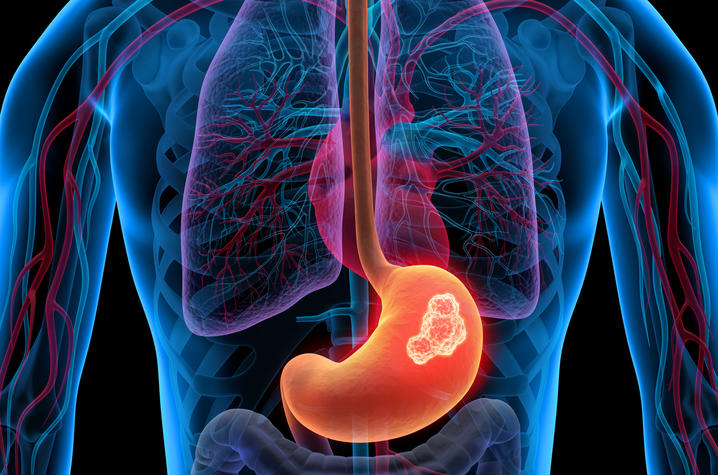Stomach cancer: Recognize the signs and reduce your risk

The University of Kentucky Public Relations and Strategic Communications Office provides a weekly health column available for use and reprint by news media. This week's column is by UK Markey Cancer Center surgeon Joseph Kim, M.D.
LEXINGTON, Ky. (April 22, 2024) — While stomach cancer was in the headlines not long ago with the sudden death of musician Toby Keith, the diagnosis is relatively rare. Stomach cancer now accounts for 1.4% of new cancer cases in the U.S., down from nearly 10% from 30 years ago.
With an average age at diagnosis of 68, stomach cancer is more common among older individuals. But it can happen to anyone, so it’s important to understand its symptoms, risk factors and steps you can take to lower your risk.
What are the signs and symptoms of stomach cancer?
Early stage stomach cancer often has no symptoms. As the cancer progresses, patients may experience abdominal pain or discomfort, feeling bloated or full after eating small amounts, nausea or vomiting, unexplained weight loss, blood in the stool and difficulty swallowing.
What causes stomach cancer?
There are not always clear risk factors for developing stomach cancer, but some factors tend to be associated with the onset of the disease. These include:
- Heavy consumption of smoked, salted and processed meats
- A diet low in fruits, vegetables and fiber rich foods
- Smoking tobacco
- Being overweight or obese
Other risk factors include gastroesophageal reflux disease (GERD), a family history of stomach cancer, Epstein-Barr virus and H. pylori bacterial infection.
What can I do to reduce my risk?
While there is no guaranteed way to prevent stomach cancer, you can lower your risk by:
- Eating a balanced diet with plenty of fruits, vegetables and whole grains. Limit processed meats and smoked or salty foods.
- Maintaining a healthy weight through diet and exercise
- Quitting smoking and limiting alcohol consumption
Can I get screened for stomach cancer?
Routine screening isn't currently recommended for everyone. But if you have certain risk factors, like H. pylori infection or a family history of stomach cancer, talk to your doctor about screening options like upper endoscopy or blood tests.
While treatments have progressed in recent years, the five-year relative survival rate for stomach cancer is 35.7%. Early detection can make all the difference for better treatment outcomes, so don't hesitate to reach out to your health care provider if you experience any symptoms or have risk factors that warrant screening.
UK HealthCare is the hospitals and clinics of the University of Kentucky. But it is so much more. It is more than 10,000 dedicated health care professionals committed to providing advanced subspecialty care for the most critically injured and ill patients from the Commonwealth and beyond. It also is the home of the state’s only National Cancer Institute (NCI)-designated Comprehensive Cancer Center, a Level IV Neonatal Intensive Care Unit that cares for the tiniest and sickest newborns and the region’s only Level 1 trauma center.
As an academic research institution, we are continuously pursuing the next generation of cures, treatments, protocols and policies. Our discoveries have the potential to change what’s medically possible within our lifetimes. Our educators and thought leaders are transforming the health care landscape as our six health professions colleges teach the next generation of doctors, nurses, pharmacists and other health care professionals, spreading the highest standards of care. UK HealthCare is the power of advanced medicine committed to creating a healthier Kentucky, now and for generations to come.




